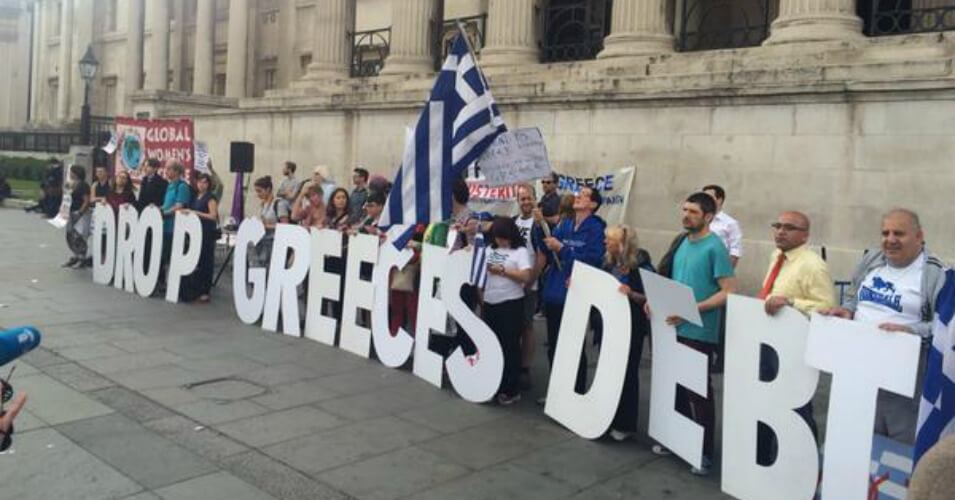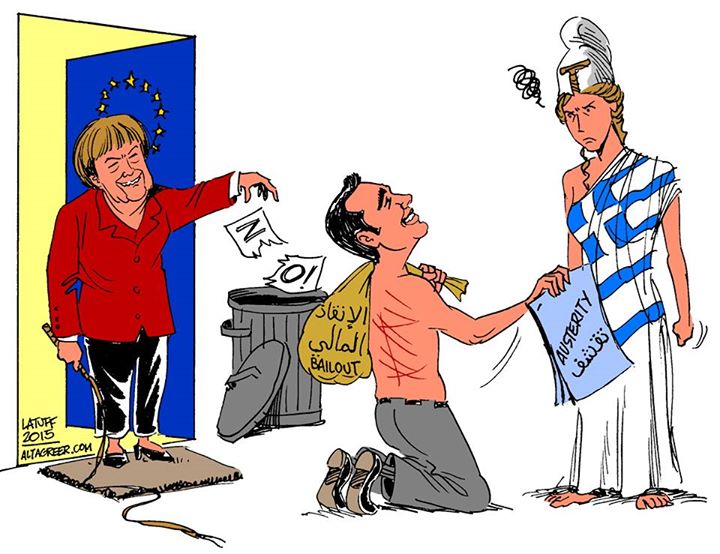By Dick Nichols
That deal, which the Syriza-led government of Prime Minister Alexis Tsipras felt forced to swallow despite the Greek people rejecting an earlier version by over 60% in a referendum last July, will provide the country with €86 billion. About 90% of this will go to paying off debt.
In turn, the tightly policed Greek government must continue to implement a package of strict austerity “reforms”. These cover pension cuts, tax rises, privatisations and labour market deregulation.
On April 22, Jeroen Dijsselbloem, Dutch president of the Eurogroup of finance ministers, said that an in-principle agreement had been reached. This involves the Greek government committing to implement a “contingent” €3 billion bundle of extra cuts if the country fell behind on its debt reduction targets.
Differences over debt
The supposed compensation for Greece was a statement that the Eurogroup was “ready to begin discussions on possible options for granting Greece some debt relief”.
At the same time, the persistent differences between the Eurogroup and IMF over how best to extract “good behaviour” from Greece were resolved.
The majority Eurogroup stance, imposed by the German government, was that Greece under a Syriza-led government would always be a repeat offender. It would grasp at any debt relief to lapse back into “bad habits” of public sector waste, excessive wages and social welfare dependence and chronic tax evasion.
By contrast, the position of IMF economists was that it was impossible for Greece to meet its debt and deficit reduction targets without some debt relief.
However, on April 22, IMF managing director Christine Lagarde in effect moved across to the Eurogroup position when she said that Greece’s debt load could be made sustainable without any reduction in its total, but through measures like extending maturities and having grace periods on repayments.
Her shift effectively puts the IMF in breach of its own statutes, which forbid it from lending to countries that it judges cannot meet debt repayment targets—which depressed Greece cannot. The IMF also supported the Eurogroup’s “contingent” €3 billion penalty proposal.
Dissent in Syriza
Greek finance minister Euclid Tsakalotos made it clear on April 25 that the proposal to hang another axe over Greece’s neck would not pass the Greek parliament — especially given that it had already agreed to a €5.4 billion package of tax hikes and pension cuts.
On April 27, Tsipras asked Donald Tusk, the president of the European Council of EU heads of state, to convene a European Council meeting to discuss the Eurogroup proposal. Tusk refused, saying: “I am convinced that there is still work to be done by the ministers of finance who have to avoid a situation of renewed uncertainty for Greece.”
This hitch set off alarm bells in Greek debt and stock markets: 10-year bonds jumped 50 basis points to 9.14% while the Athens stock market index fell 4.3%.
The Syriza-led administration now finds itself in its tightest corner to date. The ruling coalition won the September 20 elections with the message that the memorandum agreement, though very bad, was the best that could be achieved.
Moreover, Syriza said it alone could be trusted to implement a “parallel program” to defend Greece’s most vulnerable citizens against the impact of the memorandum — and continue the fight against Greece’s corrupt political and media establishment.
Only six months later, and despite the best efforts of the Tsipras government, this message is wearing thin even as Greeks remain divided over how to respond to the country’s creditors. Within Syriza, voices expressing concern at growing alienation with the government are being heard more frequently.
This is not surprising. Since its re-election, the Syriza-led government has sold off ports and airports at knock-down prices, increased taxes and cut pensions. It has also been forced to convert Greece into a holding pen for tens of thousands of refugees.
It has faced strikes and protests from public servants, farmers and truck drivers, who all stand to receive pensions even more miserable than those on which pensioners try to survive today.
The government has introduced a series of measures to alleviate the pain of the worst affected, but has been hamstrung by the ongoing shrinking of budget income due to austerity. In this context, even measures that would otherwise have been popular, like introducing Greece’s first ever system of TV licensing to break the conservative media oligarchy, have had diminished impact.
On April 15, the Macropolis website said the “movement of 53”, the most left-leaning of the groupings within Syriza with 11 MPs including Tsakalotos, issued a critical statement. It warned that, while Syriza had been able to plausibly argue at the September poll that it had been forced into signing the third bailout, the memorandum was now increasingly seen as the left coalition’s own program, rather than one imposed by Greece’s creditors.
The group also criticised the government’s slow progress in implementing the parallel program. The statement stressed that much more was needed to maintain the belief of Syriza’s supporters.
Most tellingly, it said it disagreed with the opinion of the Tsipras leadership that Syriza should try to stay in government at all costs. It said the government should “fall heroically resisting the internal or external troika rather than humiliatingly at the hands of [Greek] society itself”.
Negative mood
The latest Kapa poll, carried out in mid-April for the daily To Vima, provides a snapshot of the present mood in Greece.
On the one hand, 70.6% of those interviewed have a negative or very negative view of the way the government is conducting negotiations with Greece’s creditors. Almost 78% disapprove of its overall work and 55% are opposed to further austerity measures and would vote them down if a referendum were held.
However, no clear majority exists for an alternative policy to the one being followed by the Tsipras administration.
For example, 38.5% would support breaking off negotiations with the Troika, 29% think they should be concluded however possible, and 27% think they should be dragged out to get the best possible result.
Only 34.3% want any final agreement put to a referendum, while 46.3% want it voted on by parliament. A narrow majority (46.3% to 38.4%) want the parliamentary opposition to support any such deal.
Support for staying in the eurozone remains at 60% despite the last six years of brutal austerity. But 44.5% believe Greece should consider leaving the euro over the next five years.
Seventy per cent of those interviewed think a government better than the present one is possible, but more oppose early elections (48%) than support them (40%).
Traditional right-wing party New Democracy now leads Syriza in most polls. Tsipras is no longer unambiguously preferred as prime minister and the number of undecided voters has jumped, even while there has been no noticeable swing to any of the smaller parties (left, centre or right).
Quartet aims for knock-out
In this context, the Quartet has been looking for ways to deliver some knock-out blows to a government which, though increasingly groggy, is still on its feet. The creditors’ main weapon is what it has always been — the country’s debt obligations, the next of which is a €3.5 billion payment due in July.
The Quartet’s strategy, implemented through the unaccountable Eurogroup, is to increase the pain the Tsipras government has to inflict on its support base as a price for getting desperately needed funds. The aim is to open the way for the corrupt, discredited New Democracy to defeat it in the next elections and discredit the very idea of a radical left alternative — not just in Greece but across Europe.
This strategy is borne out by the Eurogroup’s rejection of Tsakalotos’s alternative proposal to “contingent” cuts — a commitment to meet deficit targets in case of shortfall, but with the measures to be decided by the Greek government itself.
Further evidence comes in the increasingly bewildered commentaries of economic commentators, who scratch their heads as to why the Quartet continues pushing policies that are bound to keep Greece in recession.
Writing in Forbes, financial journalist Frances Coppola could only find an adequate comparison to the Quartet’s treatment of Greece in the pillaging of Germany by the victor nations after World War I.
She said: “[T]he 3.5% [budget surplus] target has nothing to do with reality … It exists solely to preserve the fiction that Greece’s debt is sustainable, and therefore avoid European creditors having to sell to their electorates the unpleasant truth that Greece will never be able to pay this money back. It inflicts pain on the Greek people to no purpose, purely to placate creditors.
“No doubt many of you are wondering now how the IMF can possibly participate in this ‘Carthaginian peace’. But the IMF is a creditor too. It wants its money back.
“Neither the European creditors nor the IMF are fundamentally interested in restoring Greece. What they disagree over is how much sustenance Greece needs to stay alive enough to pay them back. They are all vampires.”
In February, Tsipras told Dutch Socialist Party leader Emile Roemer that “if we don’t succeed within a few months in showing that there’s light at the end of the tunnel, it will all have been for nothing. Then the middle class and the farmers will rebel and our country will fall prey to chaos”.
If that is so, will the Syriza-led government just succumb to the aggression of its creditors?
[Dick Nichols is Green Left Weekly‘s European correspondent, based in Barcelona. A longer version of this article will soon be available at Links International Journal of Socialist Renewal. Nichols will be speaking at the Socialist for the 21st Century conference, held in Sydney over May 13-15, on the struggle against austerity in Europe.]











